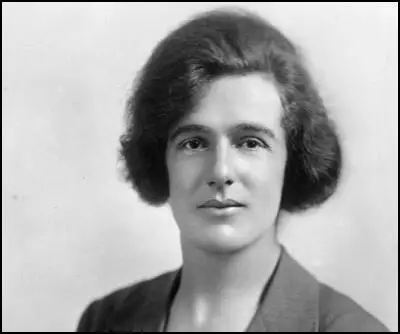On this day on 12th June
On this day in 1802 Harriet Martineau, the daughter of a textile manufacturer from Norwich, was born. Thomas and Elizabeth Martineau were Unitarians and held progressive views on the education of girls. The three girls received a similar education to their three brothers. However, where the boys were sent away to university, the girls were expected to stay at home.
Harriet thought this was very unfair and in 1823 the Unitarian journal, Monthly Repository, published her anonymous article, On Female Education. Her brother James Martineau praised it, and when he discovered that his sister was the author, said: "Now, dear, leave it to the other women to make skirts and darn stockings, and you devote yourself to this."
Harriet's father attempted to arrange for her to marry John Hugh Worthington. After some hesitation she accepted but later she changed her mind. Instead of marriage, Harriet continued writing articles for the Monthly Repository. After the death of her father in 1829, Harriet moved to London where William Fox, the editor of the journal, paid her a small wage.
As well as articles for the Monthly Repository, Harriet Martineau began to write religious books such as Devotional Exercises for the Use of Young Persons (1826) and Addresses fir the Use of Families (1826). Martineau then turned to the ambitious project of writing books on politics and economics for the ordinary reader. The material was presented as a series of stories and revealed both her passion for social reform and the influence of Jeremy Bentham and John Stuart Mill. Her book Illustrations of Political Economy (1832) was a great success and brought her financial independence. This book was followed by another bestseller, Poor Laws and Paupers Illustrated (1834).
Now a wealthy woman, Harriet Martineau, decided to spend the next two years travelling in the USA. On her return she published Society in America (1837). The book was mainly a critique of America's failure to live up to its democratic principles. Martineau was especially concerned about the treatment of women and called one chapter The Political Non-existence of Women. She claimed that women were treated like slaves. They were both "given indulgence rather than justice". Martineau argued for an improvement in women's education, so that "marriage need not be their only object in life."
In 1839 Martineau had her first novel, Deerbrook, published. This was followed by The Hour and the Man (1840) based on the life of the slave leader, Toussaint L'Ouverture. The Playfellow, a volume of children's stories, was published in 1841.
Harriet Martineau moved to the Lake District in 1845 where she built herself a house near Ambleside. Her next major publication was The History of the Peace (1849) a history of England between 1816 and 1846. This was followed by Letters on the Laws of Man's Nature and Development (1851). The book created a sensation as it was a complete rejection of religious belief. The publication of the book ended her friendship with her brother, James Martineau, who was now a leading figure in the Unitarian Church.
In 1852 Harriet Martineau joined the staff of the Daily News. Over the next sixteen years she wrote over 1600 articles for the newspaper. Martineau also wrote articles on the employment of women for the Edinburgh Review and state education for girls in the Cornhill Magazine. In 1866 she joined with Elizabeth Garrett Anderson, Emily Davies, Dorothea Beale and Francis Mary Buss to present a petition asking Parliament to grant women the vote. She also wrote articles in favour of women being allowed to enter the medical profession.
In 1869 Martineau began writing articles for the Daily News attacking the Contagious Diseases Acts. These acts had been introduced in the 1860s in an attempt to reduce venereal disease in the armed forces. Martineau objected in principal to laws that only applied to women. Under the terms of these acts, the police could arrest women they believed were prostitutes and could then insist that they had a medical examination. She helped form the National Association for the Repeal of the Contagious Diseases Act. Later Josephine Butler was to become the leading figure in this organisation, but she admitted that it was Martineau who got the campaign going.
Martineau had always suffered from poor health. Between 1839 and 1844 she had been forced to live as a complete invalid. Although she recovered, by the 1870s she had to bring an end to the number of meetings and demonstrations she was attending. Harriet Martineau continued to write pamphlets and articles on women's rights until her death from bronchitis on 27th June 1876.
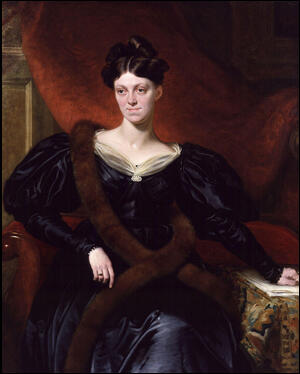
On this day in 1819 Charles Kingsley, the son of a vicar of Holne in Devon, was born in 1819. Educated at King's College, London, and Magdalene College, Cambridge, he became curate of Eversley in Hampshire in 1842.
As a young man, Kingsley was influenced by The Kingdom of Christ (1838) by Frederick Denison Maurice. In the book Maurice argued that politics and religion are inseparable and that the church should be involved in addressing social questions. Maurice's book rejected individualism, with its competition and selfishness, and suggested a socialist alternative to the economic principles of laissez faire.
Kingsley became a supporter of Chartism and after the decision by the House of Commons to reject the Chartist Petition in 1848, he joined with Frederick Denison Maurice and Thomas Hughes to form the Christian Socialist movement. The men discussed how the Church could help to prevent revolution by tackling what they considered were the reasonable grievances of the working class.
The Christian Socialists published two journals, Politics of the People (1848-1849) and The Christian Socialist (1850-51). Kingsley contributed several articles for this journals under the pseudonym of Parson Lot. The group also produced a series of pamphlets under the title Tracts on Christian Socialism. Other initiatives included a night school in Little Ormond Yard and helping to form eight Working Men's Associations.
In 1850 Kingsley novel Alton Locke was published. The book attempted to expose the social injustice suffered by agricultural labourers and workers in the clothing trade. In the book Kingsley also describes the Chartist campaign that he was involved with in the 1840s.
Kingsley followed Alton Locke with the historical novel, Hypatia (1853). Based on the real-life story of Hypatia, a philosophy teacher in 5th century Alexandria, who was murdered by a group of fanatical Christians because they disapproved of her political and religious ideas. In 1857 Kingsley published Two Years Ago, a novel about how poor sanitary conditions and public apathy cause an outbreak of cholera.
In 1863 Kingsley published his most famous book, The Water Babies. The book, written for his youngest son, tells the story of a young chimney-sweep, who runs away from his brutal employer. In his flight he falls into a river and is transformed into a water baby. Thereafter, in the river and in the seas, he meets all sorts of creatures and learns a series of moral lessons.
Kingsley, who held the post of Professor of Modern History at Cambridge University between 1860-69, also wrote Westward Ho! (1855), The Heroes (1856), Hereward the Wake (1866) and At Last (1871). Charles Kingsley died on 23rd January 1875.
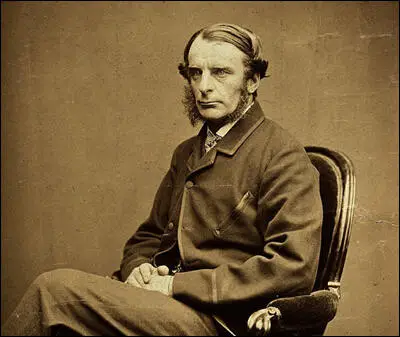
On this day in 1840 women were banned from speaking at the World Anti-Slavery Convention held at Exeter Hall in London.
Anne Knight became aware that the artist, Benjamin Robert Haydon, had started a group portrait of those involved in the fight against slavery. She wrote a letter to Lucy Townsend complaining about the lack of women in the painting. "I am very anxious that the historical picture now in the hand of Haydon should not be performed without the chief lady of the history being there in justice to history and posterity the person who established (women's anti-slavery groups). You have as much right to be there as Thomas Clarkson himself, nay perhaps more, his achievement was in the slave trade; thine was slavery itself the pervading movement."
When the painting was completed it did not include Lucy Townsend or most of the leading female campaigners against slavery. Clare Midgley, the author of Women Against Slavery (1995) points out that as well as Anne Knight and Lucretia Mott, it does feature Elizabeth Pease, Mary Anne Rawson, Amelia Opie and Annabella Byron: "Haydon's group portrait is exceptional in that it does record the existence of women campaigners. Most other memorials did not. There are no public monuments to women activists to complement those to William Wilberforce, Thomas Clarkson and other male leaders of the movement... In the written memoirs of these men, women tend to appear as helpful and inspirational wives, mothers and daughters rather than as activists in their own right."
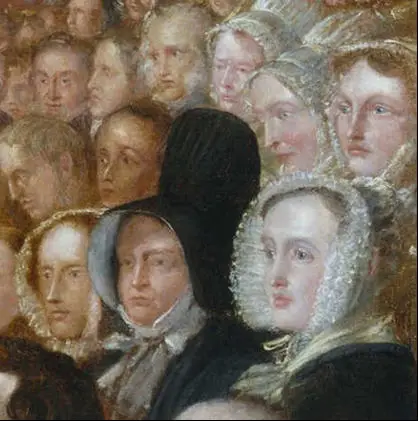
showing from left to right, bottom row: Annabella Byron, Amelia Opie,
Mary Anne Rawson, top row, Anne Knight, Mrs John Beaumont and Elizabeth Pease.
On this day in 1883 Margaret Haig Thomas, the only daughter of David Alfred Thomas and Sybil Haig, was born at Princes Square, Bayswater. She was educated at Notting Hill High School and St Leonards School.
According to her biographer, Deirdre Beddoe: "She received a sound academic education, but there really never was any serious expectation that a girl of her class would work for a living. On leaving school she took the next logical step in the career progression of an upper-class girl and came out. Chaperoned by her long-suffering mother, she endured three successive London seasons. Paralysed by shyness and incapable of small talk, she found this an agonizing experience and she took herself off to Somerville College, Oxford, primarily to escape the horrors of a fourth London season, but gave that up and returned after less than a year."
Margaret married Humphrey Mackworth in 1908. Four months later she joined the Women's Social and Political Union (WSPU). She became secretary of the Newport branch and invited speakers such as Emmeline Pankhurst and Annie Kenney to Wales. During the 1910 General Election she attacked the car of Herbert Asquith. A supporter of the WSPU's arson campaign, she was sent to prison for trying to destroy a post-box with a chemical bomb. However, a hunger-strike led to her early release.
On the outbreak of the First World War, Margaret accepted the decision by the WSPU leadership to abandon its militant campaign for the vote. For the next of couple of years she worked closely with her father, who was sent by David Lloyd George to the United States to arrange the supply of munitions for the British armed forces. In May 1915, Margaret was returning from the United States on the Lusitania when it was torpedoed by a German submarine. Although over a thousand passengers died, Margaret was one of those fortunate enough to be rescued.
Awarded the title Lord Rhondda, David Alfred Thomas was appointed Minister of Food in 1917. Margaret was also given a government post as Director of of Women's Department of the Ministry of National Service. Her report on the Women's Royal Airforce in 1918 led to the dismissal of its commander, Violet Douglas-Pennant and her replacement by Helen Gwynne-Vaughan.
On the death of her father David Alfred Thomas in July 1918. As Deirdre Beddoe points out: "Margaret inherited his property, his commercial interests, and his title. The Directory of Directors for 1919 listed Viscountess Rhondda, as she now was, as the director of thirty-three companies (twenty-eight of them inherited from her father) and chairman or vice-chairman of sixteen of these. Already a famous figure whose activities were widely reported in the London press on account of her business career and of her increasingly leading role as a spokeswoman for feminism, her campaign to take her seat in the House of Lords attracted a great deal more publicity.... But although in 1922 she seemed to have won, when the committee of privileges accepted her plea for admission, the decision was reversed in May 1922."
Lady Rhondda divorced her husband and set up home with Helen Archdale. According to Archdale's biographer, David Doughan: "Helen Archdale had an intense relationship with Lady Rhondda, which seems to have begun in committee work during the First World War, though they also shared a background in suffrage militancy. By the early 1920s, she was sharing an apartment, and, together with her family, a country house (Stonepits, Kent) with Lady Rhondda."
In 1920 Lady Rhondda founded the political magazine Time and Tide. It was initially edited by her lover, Helen Archdale. In 1921 she launched the Six Point Group of Great Britain, which focused on what she regarded as the six key issues for women: The six original specific aims were: (1) Satisfactory legislation on child assault; (2) Satisfactory legislation for the widowed mother; (3) Satisfactory legislation for the unmarried mother and her child; (4) Equal rights of guardianship for married parents; (5) Equal pay for teachers; (6) Equal opportunities for men and women in the civil service.
At first Time and Tide supported left-wing causes but over the years the magazine, like its owner, moved to the right. As David Doughan points out: "However, philosophical disagreements, as well as Lady Rhondda's increasing editorial interventions, resulted in her being effectively forced out of the editorship of Time and Tide in 1926. Although she remained a director of Time and Tide Publishing Company, after her resignation specifically feminist concerns were gradually marginalized in Time and Tide."
Lady Rhondda did not allow politics to get in the way of good writing and contributors to the magazine included D. H. Lawrence, Rebecca West, Vera Brittain, Winifred Holtby, Virginia Woolf, Crystal Eastman, Charlotte Haldane, Storm Jameson, Nancy Astor, Margaret Bondfield, Margery Corbett-Ashby, Charlotte Despard, Emmeline Pankhurst, Eleanor Rathbone, Olive Schreiner, Helena Swanwick, Margaret Winteringham, Ellen Wilkinson, Ethel Smyth, Emma Goldman, George Bernard Shaw, Ernst Toller, Robert Graves and George Orwell. However, it never sold well and it is estimated that during the thirty-eight years she lost over £500,000 on the magazine.
As well as editing Time and Tide, Lady Rhondda wrote a memoir of her father and an autobiography, This Was My World (1933). After breaking up with Helen Archdale she moved in with Theodora Bosanquet, the secretary of the International Federation of University Women.
Margaret Haig Thomas, Lady Rhondda, died in the Westminster Hospital on 20th July 1958.
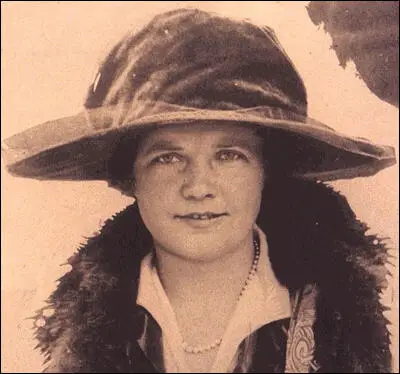
On this day in 1897 Anthony Eden, the son of Sir William Eden, the High Sheriff of Durham, was born at Windlestone Hall, near Bishop Auckland. His father, was an "eccentric country squire who, besides having an interest in foxhunting and gardening, was a better than average amateur painter and a first-rate boxer.... Anthony's mother, the former Sybil Frances Grey, was a gentle, cultivated woman and a great beauty whose portrait was painted by James McNeill Whistler."
Eden, like his father and grandfather, was educated at Eton. "Eden was a sensitive child, who had a somewhat lonely upbringing at Windlestone Hall. His father was an irascible and distant figure, though Eden's aesthetic sensibility, not to mention his sometimes short temper, was inherited from his father, who was an amateur painter of renown and a noted collector of art. From his mother, a renowned society beauty, not over-cautious in financial matters, he inherited charm and his handsome bearing."
Eden hoped to go to Sandhurst before joining the British Army, but was rejected because of his poor eyesight. With the outbreak of the First World War the British Army reduced its entry standards, and Eden was able to obtain a commission in the King's Royal Rifle Corps. His brother, Lieutenant John Eden, was killed in action on 17 October 1914, at the age of 26. Timothy, Eden's surviving elder brother, inherited the baronetcy.
Eden joined the King's Royal Rifle Corps and arrived on the Western Front and took part in his first battle in May 1916. Soon after arriving in France he heard that his sixteen year old brother, Nicholas Eden, had been killed when the Indefatigable had been sunk at the Battle of Jutland. Eden won the Military Cross at the Battle of the Somme in 1916. After one attack at at Delville Wood, Eden's battalion suffered 394 casualties, of whom 127 were killed. Nearly all the junior officers were either dead or badly wounded and as a result Eden was promoted to adjutant. On 26 May 1918 he was promoted brigade major in the 198th infantry brigade, at the age of twenty the youngest in the British army.
Eden reached the rank of captain on 13th June 1919, the day after his twenty-second birthday. After leaving demobilization and in the autumn of 1919 he entered Christ Church, University of Oxford, to read oriental languages, specializing in Persian and Arabic. He obtained first-class honours in 1922. The following year he married Beatrice Helen Beckett, daughter of Sir Gervase Beckett, a banker and owner of the politically influential Yorkshire Post. "It was a fashionable marriage that promoted his career not only among the peers and squires of Yorkshire, but also among their kind who were running the Conservative Party."
Eden became the Conservative Party candidate for Warwick and Leamington. The Independent Labour Party candidate was Daisy Greville, Countess of Warwick. Eden won easily with 16,337 votes. George Nicholls, the Liberal Party candidate finished second with 11,134 with the Countess finishing third with 4,015 votes. Eden later wrote that the election "gave me an unexpected opportunity to defeat my sister's mother-in-law, the Countess of Warwick, who had taken up the cause of socialism."
Eden was a strong supporter of Stanley Baldwin, who wanted to move the Conservative Party to the left. This was reflected in a speech Baldwin made in May, 1924, where he commented on the changes that were taking place in politics: "The government had no mandate to govern, and its members won their seats as a Socialistic vote, but were not carving out a Socialist policy. This could be only temporary. If words meant anything the Labour Party was a Socialist Party, and if they went back on socialism they were little more than a left wing of the Conservative Party. Socialism had certain obvious advantages, possessing cut and dried remedies for every evil under the sun, but Conservatives have been in the fore-front of the battle to help the people more… If we are to live as a party we must live for the people in the widest sense… Every future Government must be Socialistic."
Stanley Baldwin took a keen interest in this young MP and in July 1926 Eden was appointed parliamentary private secretary to Sir Austin Chamberlain, the foreign secretary. According to his biographer, D. R. Thorpe: "This decisive promotion conditioned much of Eden's later thinking, and he learned at first hand from Sir Austen Chamberlain how the Foreign Office operated. Like his mentor, Eden believed that the best way to keep the peace in Europe was to remain on good terms with France, at a time when many in the Conservative Party were impatient of such views, favouring rapprochement with Germany. With Chamberlain's illness and absence in 1928 Eden achieved unexpected autonomy and was widely regarded as a potential foreign secretary."
Eden was a member of a group of young Tory MPs who according to Eden were to the "left of centre in our own party". The group included Noel Skelton, Oliver Stanley, William Ormsby-Gore, Walter Elliot and William S. Morrison. Eden later recalled: "Stanley Baldwin was accessible and to members of our small group he was the most sympathetic, sharing our youthful ideas for a progressive Conservatism which would have positive aims, and knowing what we meant by such expressions as 'a property-owning democracy'. I believe that it was Noel Skelton, a thought-provoking young Scotsman and a close friend of mine, who first used this phrase in our talks together during this Parliament."
In November 1926 Baldwin appointed John C. Davidson as chairman of the Conservative Party organization. Baldwin and Davidson wanted to change the image of the Conservative Party to make it appear a less right-wing organisation. In March 1927 He suggested to his Cabinet that the government should propose legislation for the enfranchisement of nearly five million women between the ages of twenty-one and thirty. This measure meant that women would constitute almost 53% of the British electorate. The Daily Mail complained that these impressionable young females would be easily manipulated by the Labour Party.
Eden fully supported this reform but those on the right of the party like Winston Churchill, argued that the affairs of the country ought not be put into the hands of a female majority. In order to avoid giving the vote to all adults he proposed that the vote be taken away from all men between twenty-one and thirty. He lost the argument and in Cabinet and asked for a formal note of dissent to be entered in the minutes. There was little opposition in Parliament to the bill and it became law on 2nd July 1928. As a result, all women over the age of 21 could now vote in elections.
Stanley Baldwin firmly believed that he would win the 1929 General Election. He realised that he did not have a good manifesto, "but thought that his reputation as a moderate statesman, calmly if slowly steering the country in the right direction, would overcome that". In its manifesto the Conservative Party blamed the General Strike for the country's economic problems. "Trade suffered a severe set-back owing to the General Strike, and the industrial troubles of 1926. In the last two years it has made a remarkable recovery. In the insured industries, other than the coal mining industry, there are now 800,000 more people employed and 125,000 fewer unemployed than when we assumed office... This recovery has been achieved by the combined efforts of our people assisted by the Government's policy of helping industry to help itself. The establishment of stable conditions has given industry confidence and opportunity."
The Labour Party attacked the record of Baldwin's government: "By its inaction during four critical years it has multiplied our difficulties and increased our dangers. Unemployment is more acute than when Labour left office.... The Government's further record is that it has helped its friends by remissions of taxation, whilst it has robbed the funds of the workers' National Health Insurance Societies, reduced Unemployment Benefits, and thrown thousands of workless men and women on to the Poor Law. The Tory Government has added £38,000,000 to indirect taxation, which is an increasing burden on the wage-earners, shop-keepers and lower middle classes."
In the 1929 General Election the Conservatives won 8,656,000 votes (38%), the Labour Party 8,309,000 (37%) and the Liberals 5,309,000 (23%). However, the bias of the system worked in Labour's favour, and in the House of Commons the party won 287 seats, the Conservatives 261 and the Liberals 59. The Conservatives lost 150 seats and became for the first time a smaller parliamentary party than Labour. David Lloyd George, the leader of the Liberals, admitted that his campaign had been unsuccessful but claimed he held the balance of power: "It would be silly to pretend that we have realised our expectations. It looks for the moment as if we still hold the balance." However, both Baldwin and MacDonald refused to form a coalition government with Lloyd George. Baldwin resigned and once again MacDonald agreed to form a minority government.
Anthony Eden responded to this defeat by a speech to party workers in November, 1929: "The outcome of the general election will not prove an unmixed evil if it affords the Conservative Party an opportunity to set its own house in order, to re-examine its own beliefs, to reaffirm them, and to present to the country the policy by which it hopes to see them realized... The Conservative objective, therefore, must be to spread the private ownership to property as widely as possible, to enable every worker to become a capitalist. The status of the worker in industry must be raised."
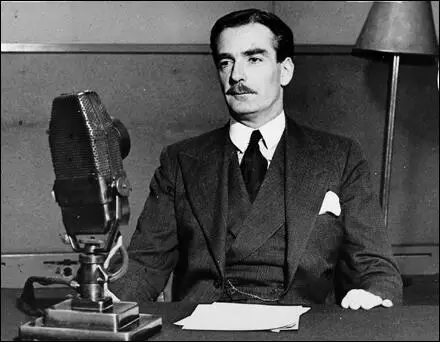
On this day in 1929 Anne Frank was born into a Jewish family in Frankfurt-am-Main, Germany. When Adolf Hitler came to power in 1933, Otto Frank, his wife and two children, Anne and Margot moved to Amsterdam.
When the German Army occupied the Netherlands, the family went into hiding. For the next twenty-five months they lived in a sealed-off office back-room. Anne Frank's decided to keep a diary. Her first entry on 8th July, 1942, recorded her feelings about going into hiding: "Into hiding - where would we go, in a town or to the country, in a house or a cottage? These were questions I was not allowed to ask, but I couldn't get them out of my mind. Margot and I began to pack some of our most vital belongings into a school satchel. The first thing I put in was this diary, then hair curlers, handkerchiefs, school books, a comb, old letters; I put in the craziest things with the idea that we were going into hiding. But I'm not sorry, memories mean more to me than dresses."
Three days later Anne Frank wrote: "I can't tell you how oppressive it is never to be able to go outdoors, also I'm scared to death that we shall be discovered and shot. That is not exactly a pleasant prospect. We have to whisper and tread lightly during the day, otherwise the people in the warehouse might hear us."
Soon after going into hiding the Gestapo began looking for Jews. "Dussel has told us a lot about the outside world, which we have missed for so long now. He had very sad news. Countless friends and acquaintances have gone to a terrible fate. Evening after evening the green and grey lorries trundle past. The Germans ring at every door to enquire if there are any Jews living in the house. If there are, then the whole family has to go at once. If they don't find any, they go on to the next house. No one has a chance of evading them unless one goes into hiding. Often they go round with lists, and only ring when they can get a good haul.... In the evenings, when it's dark, I often see rows of good, innocent people accompanied by crying children, walking on and on, bullied and knocked about until they almost drop. No one is spared - old people, babies, expectant mothers, the sick - each and all join in the march of death."
On the 11th April 1944 Anne Frank wrote: "Who has inflicted this upon us? Who has made us Jews different to all other people? Who has allowed us to suffer so terribly up till now? It is God that has made us as we are, but it will be God too, who will raise us up again. If we bear all this suffering and if there are still Jews left, when it is over, then Jews, instead of being doomed, will then be held up as an example. Who knows, it might even be our religion from which the world and all peoples learn good, and for that reason and that reason only do we have to suffer now."
Anne Frank became very excited when she heard about D-Day on the BBC news on 6th June, 1944: "The invasion has begun! According to the German news, British parachute troops have landed on the French coast. British landing craft are in battle with the German Navy, says the BBC. Great commotion in the Secret Annexe! Would the long-awaited liberation that has been talked of so much but which still seems too wonderful, too much like a fairy-tale, ever come true? Could we be granted victory this year, 1944? We don't know yet, but hope is revived within us; it gives us fresh courage, and makes us strong again."
On 21st July, 1944, Anne Frank heard the news about the July Plot and the death of Claus von Stauffenberg. "I'm finally getting optimistic. Now, at last, things are going well! They really are! Great News! An assassination attempt has been made on Hitler's life, and for once not by Jewish Communists or British capitalists, but by a German general who's not only a count, but young as well. The Fuhrer owes his life to 'Divine Providence': he escaped, unfortunately, with only a few minor burns and scratches. A number of officers and Generals who were nearby were killed or wounded. The head of the conspiracy has been shot. This is the best proof we've had so far that many officers and generals are fed up with the war and would like to see Hitler sink into a bottomless pit, so they can establish a military dictatorship, make peace with the Allies, rearm themselves and, after a few decades, start a new war. Perhaps Providence is deliberately biding its time getting rid of Hitler, since it's much easier, and cheaper, for the Allies to let the impeccable Germans kill each other off. It's less work for the Russians and British, and it allows them to start rebuilding their own cities that much sooner. But we haven't reached that point yet, and I'd hate to anticipate the glorious event."
In August, 1944, the family were betrayed to the Gestapo and they were arrested and deported to German occupied Poland. After spending a month in the extermination camp in Auschwitz, Anne and Margot were sent to Belsen, a concentration camp in Germany. Anne Frank and her sister both died of typhus in March, 1945.
Otto Frank, the only member of the family to survive, was rescued from Auschwitz by Red Army troops in January, 1945. After he arrived back in Amsterdam friends gave him the papers that the Gestapo had left behind after searching the hiding place. This included Anne Frank's diary that was published in the Netherlands in 1947. It has since been published into 67 languages and is one of the most widely read books in the world.
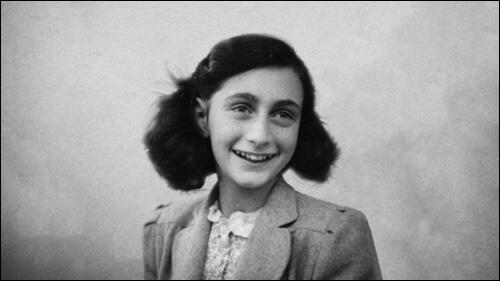
On this day in 1945 Anne Stringer interviews the Rachele Mussolini, widow of Benito Mussolini:
"I was never close to him when he was high: I was always near him when he was down." With that weeping epitaph, Benito Mussolini's gray-haired widow summed up her life with the flamboyant Duce who left her for a younger, prettier mistress at the height of his Fascist power.
Pouring out her words between choking sobs, Donna Rachele revealed in an exclusive interview that she spoke to the doomed Duce by telephone only six hours before he was slain by a band of Italian partisans near Milan last April.
We spoke informally in the six-room apartment in an abandoned synthetic rubber factory where she and her two youngest children are being held in British protective custody. Throughout the interview, Donna Rachele defended her dead husband against every accusation - except his final infidelity with Clara Petacci, who shared his death and humiliation in the bloody public square in Milan.
For the red-haired Clara, Mrs. Mussolini had nothing but hatred and a fierce satisfaction that Benito's mistress was dead. Her eyes literally flashed when Clara's name was mentioned. She pushed herself far back in her chair, sat up straight and spat out: "They've done well to hang her. She was the only one around Mussolini who had anything really to do with the Germans."
Then speaking even more furiously and pounding the table before her she almost shouted: "Mussolini (she always referred to him that way) never had anything to do with women. He never let them have any influence over him. That was propaganda just to ruin him."
She trembled with anger and emotion as she spoke, but the frail widow, still attractive in spite of her 50 years, maintained her dignity, presenting a far different picture from the hulking, peasant-type woman I have been led to expect.
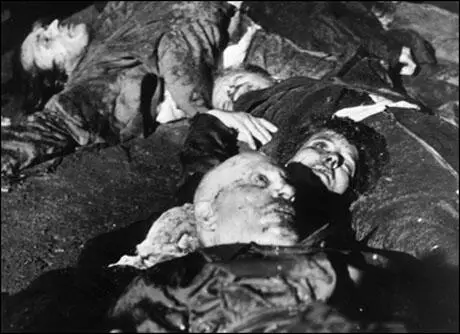
On this day in 1963 NAACP field secretary Medgar Evers is murdered. Medgar Evers was born in Decatur, Mississippi on 2nd July, 1925. He served in the United States Army during the Second World War and after he returned in 1946 he found employment selling insurance.
Evers joined the National Association for the Advancement of Coloured People (NAACP) and helped organize chapters all over Mississippi. In 1954 the NAACP employed Evers as its full-time state field secretary. This main involved Evers in monitoring, collecting and publicizing data concerning civil rights violations.
Although the national leadership of the NAACP opposed mass direct action, Evers also organized and participated in sit-in protests against segregation in Mississippi. As a result of this Evers suffered several beatings and spells in prison.
Despite several warnings from local white racist groups, Evers continued to organize protests against Jim Crow laws in Mississippi. On 11th June 1963 Lena Horne arranged to speak on the same platform as Medgar Evers. That night he was murdered in the driveway of his home. Horne said: "Nobody black or white who really believes in democracy can stand aside now; everybody's got to stand up and be counted."
Byron de La Beckworth, a white segregationist, was charged with the crime but the case ended in two hung juries but was convicted in a third trial held in 1994.
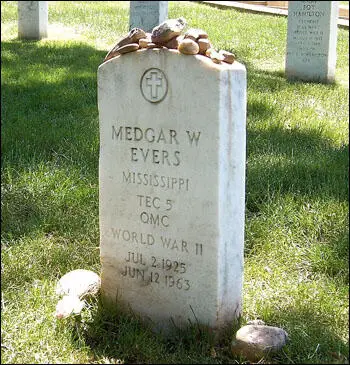
On this day in 1968 poet and critic Herbert Read died. Herbert Read was born in Kirby Moorside, Yorkshire ion 4th December 1893. Educated in Halifax and Leeds University he served during the First World War as a captain in the Yorkshire Regiment and was awarded the Military Cross for bravery.
Read published two volumes of poetry on his war experiences: Songs of Chaos (1915) and Naked Warriors (1919). He also wrote two autobiographical accounts of life on the Western Front: In Retreat (1925) and Ambush (1930).
After the war Read was assistant keeper of the Victoria and Albert Museum (1922-31), professor of fine art at Edinburgh University (1931-33) and editor of the Burlington Magazine (1933-39).
Read wrote a large number of books on art and literature including: The Meaning of Art (1931), Form in Modern Poetry (1932), Art and Industry (1936), Art and Society (1936), Education Through Art (1943), The Philosophy of Modern Art (1952) and The True Voice of Feeling (1953).
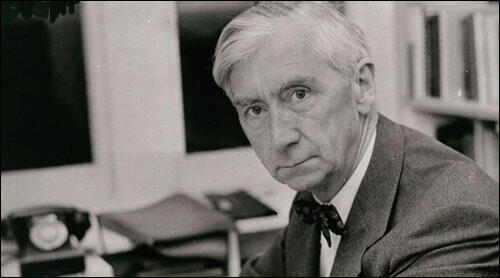
On this day in 1972 critic Edmund Wilson died. Wilson, the son of a railroad lawyer, was born in Red Bank, New Jersey on 8th May, 1895. After attending Princeton University (1912-1916), Wilson was briefly a reporter for the New York Sun.
Wilson served in the United States Army during the First World War. After working in an army hospital he was transferred to the Intelligence Unit at General Headquarters in Chaumont.
After the war Wilson became managing editor of Vanity Fair. Later he became associate editor of the The New Republic (1926-1931) and a book reviewer for the New Yorker. Deeply influenced by the ideas of Karl Marx, Wilson argued for a socially responsible fiction and helped to influence the work of novelists such as Upton Sinclair, John Dos Passos, Sinclair Lewis, Floyd Dell and Theodore Dreiser.
Throughout his life Wilson wrote plays, novels and poems. However, his most important writing was literary criticism. This included Axel's Castle (1931), Travels in Two Democracies (1936), The Triple Thinkers (1938), To the Finland Station (1940), The Wound and the Bow (1940),The Boys in the Back Room (1941), Classics and Commercials (1950) and The Shores of Light (1952).
The New Yorker wrote: "For a writer, the rarest privilege is not merely to describe his country and time but to help shape them. Wilson was among the fortunate handful of writers who have succeeded in doing this, with books that are like bold deeds and that will live a long time after him, keeping him with us against our need."
Edmund Wilson, published two autobiographies, A Piece of My Mind (1956) and Landscapes, Characters and Conversations (1967).
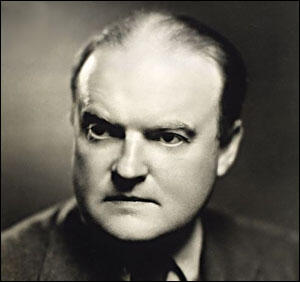
On this day in 1979 women's rights campaigner Jessie Stephen died at Bristol General Hospital aged eighty-six from pneumonia and heart failure.
Jessie Stephen, the eldest of eleven children of Alexander Stephen, tailor, and his wife, Jane Miller, was born on 19th April 1893 in Marylebone, London. When she was a child her family moved to Edinburgh. Later, they settled in Dunfermline.
In 1901 her father found work for the Co-operative Society in Glasgow. Jessie was educated at North Kelvinside School. At fourteen she won a scholarship, but had to leave school a year later because of her father's unemployment. Jessie found work as a domestic servant.
Jessie, a committed socialist, joined the Maryhill branch of the Independent Labour Party (ILP). In 1912 she started organizing maidservants in Glasgow into a domestic workers' union branch. The following year she helped establish the formation of the Scottish Federation of Domestic Workers.
Kathlyn Oliver had formed the Domestic Workers' Union of Great Britain (DWUGB) in the spring of 1910, admitting both men and women members. Its head office was at 211 Belsize Road, London. Jessie Stephen moved to London to help Oliver run the DWUGB.
Jessie Stephen became an active member of the Women's Social and Political Union (WSPU). In 1912 the WSPU began a campaign to destroy the contents of pillar-boxes. By December, the government claimed that over 5,000 letters had been damaged by the WSPU. According to her biographer, Audrey Canning: "Jessie was assigned to drop acid into local pillar boxes. while dressed in her maid's uniform. As a working-class suffragette, she enlisted the support of dockers in the ILP to deal with hecklers at WSPU meetings." In March 1913 was the youngest of a delegation of Glasgow working-women who went to London to lobby the House of Commons.
On 4th August, 1914, England declared war on Germany. The leadership of the WSPU began negotiating with the British government. On the 10th August the government announced it was releasing all suffragettes from prison. In return, the WSPU agreed to end their militant activities and help the war effort.
Emmeline Pankhurst announced that all militants had to "fight for their country as they fought for the vote." Ethel Smyth pointed out in her autobiography, Female Pipings for Eden (1933): "Mrs Pankhurst declared that it was now a question of Votes for Women, but of having any country left to vote in. The Suffrage ship was put out of commission for the duration of the war, and the militants began to tackle the common task."
Jessie Stephen disagreed with this strategy and after leaving the WSPU joined the East London Federation of Suffragettes (ELF), an organisation that combined socialism with a demand for women's suffrage, it also worked closely with the Independent Labour Party. Other members included Sylvia Pankhurst, Keir Hardie, Julia Scurr, Mary Phillips, Millie Lansbury, Eveline Haverfield, Maud Joachim, Lilian Dove-Wilcox, Nellie Cressall and George Lansbury. In the early stages of the war Jessie toured northern England to raise funds and sell the federation's journal, the The Women's Dreadnought.
In March 1916 Sylvia Pankhurst renamed the East London Federation of Suffragettes, the Workers' Suffrage Federation (WSF). The newspaper was renamed the Workers' Dreadnought and continued to campaign against the war and gave strong support to organizations such as the Non-Conscription Fellowship. The newspaper also published the famous anti-war statement by Siegfried Sassoon.
Audrey Canning has argued that: "Tall, black-haired, and handsome as a young woman, Jessie Stephen had a strong personality and excelled as a lively speaker... She attributed her vocal powers to two years' training as a contralto at the London Guildhall School of Music and enjoyed entertaining her English audiences to recitals of Hebridean folk-songs."
In 1917 Jessie Stephen became the Independent Labour Party organizer for Bermondsey, where she worked closely with ILP leader, Alfred Salter. The anti-war stance of Salter resulted in a loss of support for this left-wing member of the party. Salter wrote: "For a while it seemed as if the whole fabric of our organisation so laboriously built up in the past years, was doomed to go under."
Jessie Stephen had developed a good reputation for effective campaigning and Mary Macarthur recruited her to work for the National Federation of Women Workers. In December 1918 Jessie became secretary of its domestic workers' section. The following year she was appointed vice-chair of the catering trade for the new Ministry of Reconstruction. In 1919 she was elected to Bermondsey Borough Council.
Under the leadership of Ada Salter, London's first woman Mayor. As a socialist she declined to wear Mayoral robes or the chain of office. With a Labour majority on the council, Ada could now push on with her plans to improve the look of Bermondsey. A Borough Gardens Superintendent was employed and ordered to plant elms, populars, planes and acacias in the streets of Bermondsey. Later he added birch, ash, yew and wild cherry.
Jessie Stephen also became involved in the campaign to improve public health in Bermondsey. Special films were prepared and were shown to large crowds in the open air and pamphlets were distributed throughout the borough. A systematic house-to-house inspection was conducted to seek out conditions dangerous to health. Premises where food was sold were constantly examined and samples of foods were taken away for analysis.
During the 1926 General Strike Jessie agreed on explaining the trade union position in a tour of the United States. Speaking to large gatherings of immigrant workers from Europe, she raised substantial funds for the National Union of Mineworkers and the Socialist Party of America. She also visited where she encouraged the formation of the Canadian Union of Domestic Workers.
According to her biographer, Audrey Canning: "Besides having a talent for journalism Jessie Stephen also proved adept at running her own secretarial agency and joined the National Union of Clerks in 1938. In 1944 she was appointed as the first woman area union organizer of the National Clerical and Administrative Workers' Union for south Wales and the west of England, moving to Bristol, where she became the first woman president of the trades council and a city councillor in 1952. Jessie Stephen established close connections with the Bristol Co-operative Society after 1948, both as employee - working for eleven years with Broad Quay branch of the Co-operative Wholesale Society - and as chair of the management committee."
